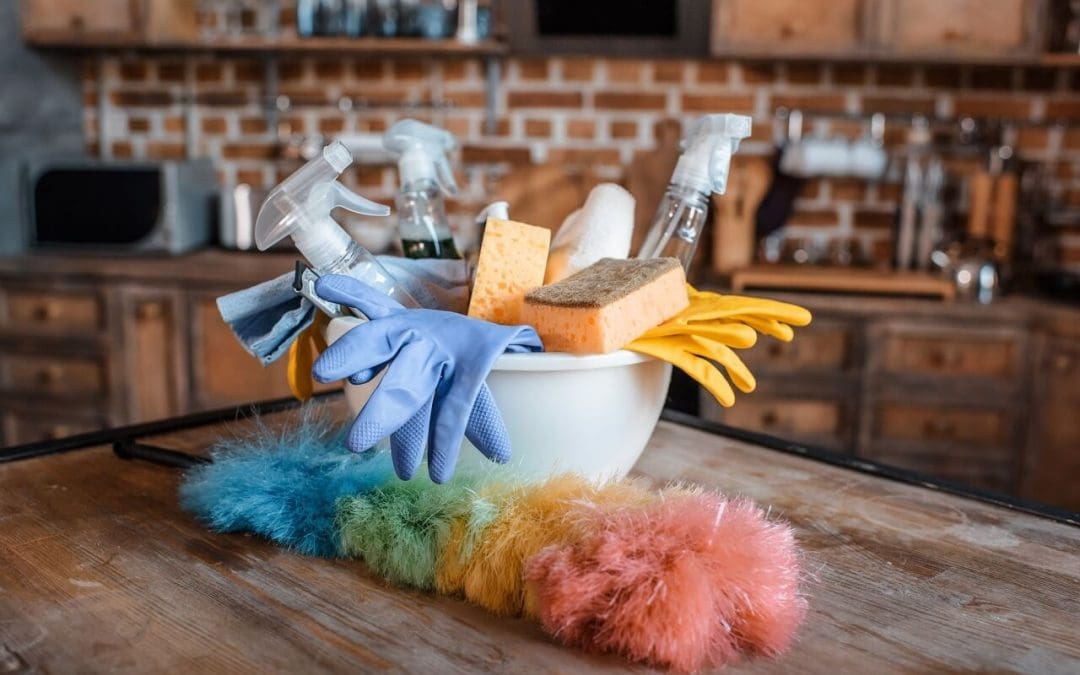Switching to homemade cleaning products is a simple way to keep your home spotless while avoiding the harsh chemicals found in many store-bought cleaners. Not only are these DIY solutions budget-friendly, but they’re also safer for your family, pets, and the environment. With just a few basic ingredients, you will create effective cleaners for every area of your home.
Why Homemade Cleaning Products Are Worth the Switch
Homemade cleaning products have been used for generations, long before commercial cleaners lined store shelves. The main advantage is knowing exactly what’s in the bottle. Many store-bought products contain synthetic fragrances, preservatives, and chemicals that may irritate skin, trigger allergies, or contribute to indoor air pollution.
When you make your own, you control the ingredients, ensuring they’re non-toxic and environmentally friendly. Vinegar, baking soda, lemon juice, and essential oils are safe and highly effective at cutting grease, removing stains, and eliminating odors. These products will save you money and reduce waste by reusing containers instead of buying new plastic bottles every time.
Essential Ingredients for Homemade Cleaning Products
Creating your own cleaning products doesn’t require a long list of specialty items. Most can be made from ingredients you likely already have at home. White vinegar is excellent for dissolving mineral deposits and disinfecting surfaces. Baking soda acts as a gentle abrasive and deodorizer. Lemon juice provides natural antibacterial properties and a fresh scent. Castile soap is a plant-based cleaner that works well for everything from floors to dishes.
Essential oils such as tea tree, lavender, or lemon will add fragrance and boost cleaning power thanks to their antibacterial and antifungal qualities. With just these basics, you can make various homemade solutions for different cleaning needs.
All-Purpose Cleaning Products You Can Make at Home
An all-purpose cleaner is essential in every household, and making your own is incredibly easy. A simple mix of equal parts water and vinegar with a few drops of essential oil will handle most surfaces, from kitchen counters to bathroom sinks. For a slightly stronger option, adding a small amount of liquid Castile soap creates a gentle yet effective cleaner for grease and grime.
If you prefer to avoid vinegar’s smell, a mixture of water, rubbing alcohol, and a few drops of essential oil offers a streak-free clean for mirrors, glass, and countertops. The beauty of homemade cleaning products is that you can adjust the strength and scent to suit your preferences.
Specialized Products for Different Areas of the Home
Some areas of the home require targeted cleaning solutions. In the kitchen, baking soda and water paste works wonders on stubborn stovetop stains, while a spray of vinegar and water helps keep cutting boards fresh. For bathrooms, vinegar mixed with dish soap will cut through soap scum on shower doors and tiles.
Floors also benefit from homemade solutions. For hardwood, a mix of warm water and a small amount of Castile soap cleans without leaving residue. For tile or vinyl, adding a splash of vinegar to the mop water helps disinfect and add shine. Laundry can get a natural boost by adding a half-cup of baking soda to the wash cycle, which helps soften clothes and neutralize odors.
Tips for Storing and Using
Once you’ve made your cleaning products, proper storage is essential to keep them fresh and effective. Glass spray bottles work well for vinegar-based cleaners, as vinegar can react with some metals and plastics over time. Label each container with its contents and date so you know when it’s time to make a new batch.
Keep your cleaning products in a cool, dry place away from direct sunlight, especially if they contain essential oils. Since these solutions don’t have synthetic preservatives, it’s best to make smaller batches that you’ll use within a month or two for maximum freshness.
FAQs
Are homemade cleaning products as effective as store-bought cleaners?
Yes, many homemade solutions are just as effective for everyday cleaning. They may require a bit more scrubbing for heavy-duty messes, but they’re safe, affordable, and reliable for most household tasks.
Can I mix vinegar and baking soda in the same cleaner?
While vinegar and baking soda react when combined, they’re best used separately. The fizzing reaction is great for unclogging drains, but is not ideal for storage in a single product.
Do essential oils make cleaning products antibacterial?
Essential oils, like tea tree and lavender, have natural antibacterial properties. While they can enhance cleaning power, they shouldn’t replace disinfectants in situations that require sterilization.
Will homemade cleaning products damage surfaces?
Most are safe for common household surfaces, but it’s always best to test in a small, hidden area first—especially on natural stone, which can be sensitive to acidic ingredients like vinegar or lemon juice.
How can I make my cleaning products smell better?
Adding a few drops of your favorite essential oil boosts cleaning power and leaves a pleasant scent. Citrus, mint, and floral oils are popular choices for a fresh-smelling home.
A Plus Inspections of Texas provides home inspections in Conroe, TX, and surrounding areas. Contact us to schedule an appointment.

